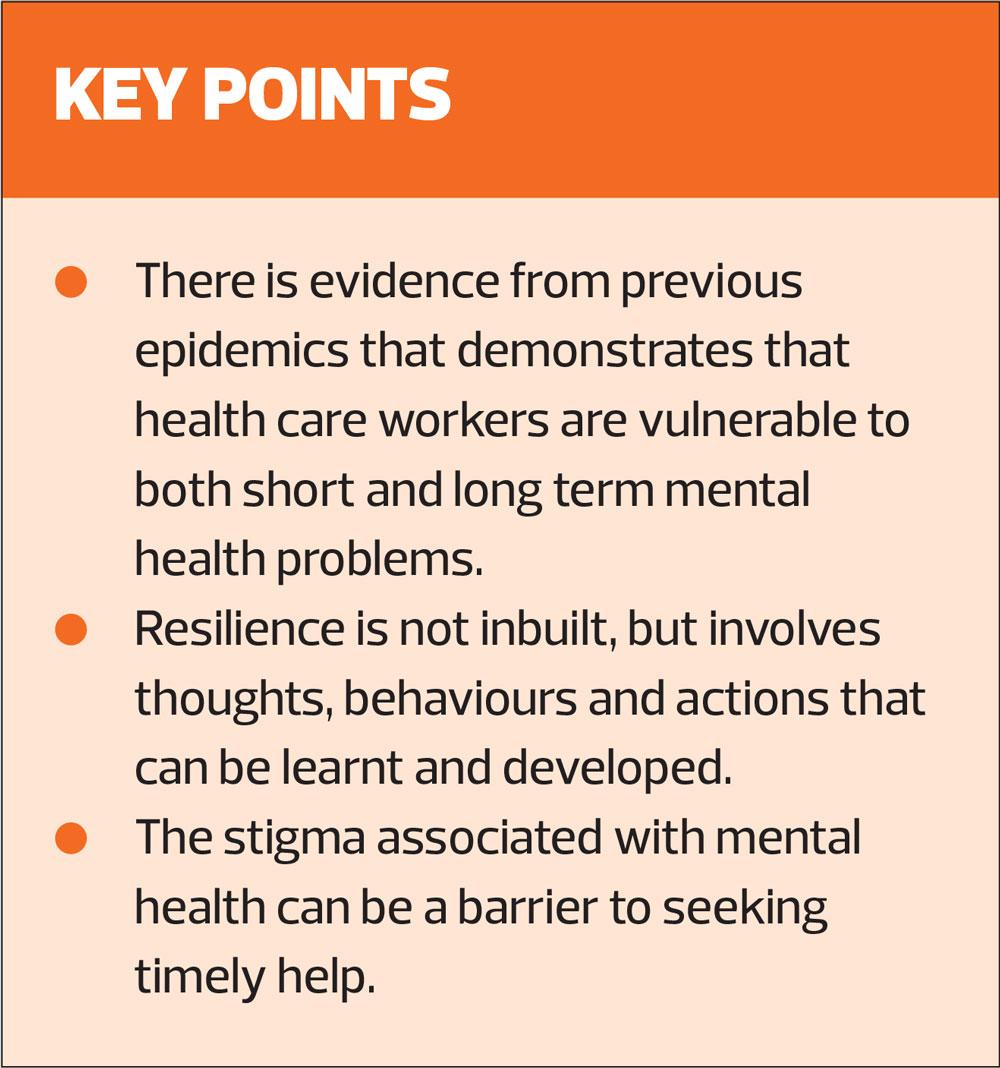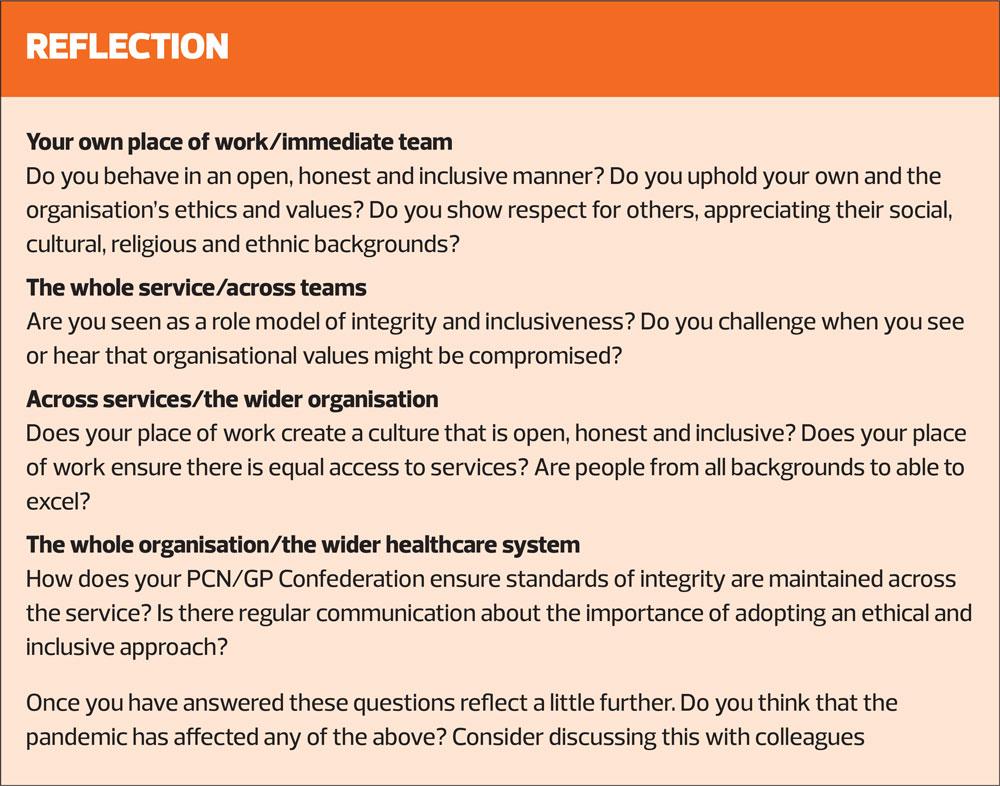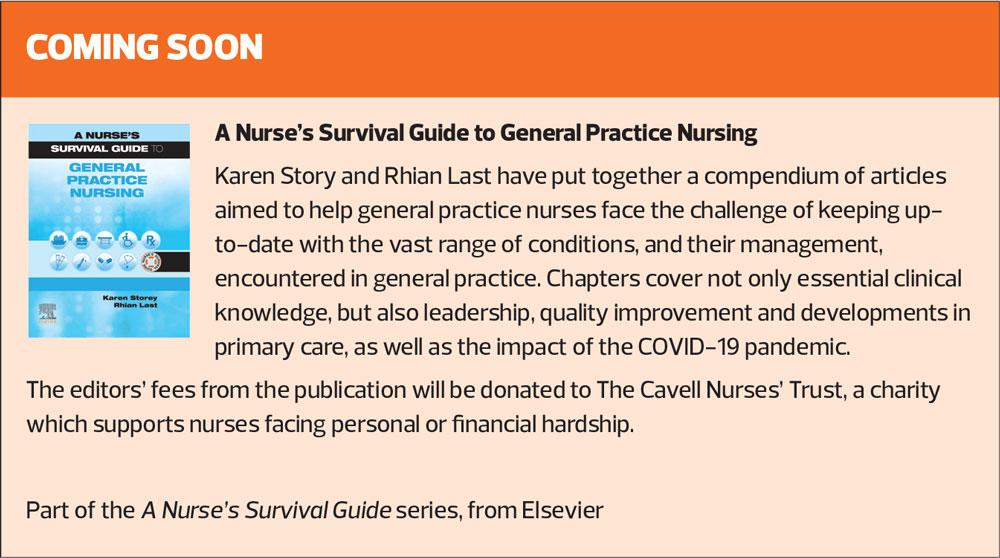Resilience for General Practice Nurses – The impact of COVID-19
Rhian Last
Rhian Last
RN
Sponsor for Leeds BAME Primary Care Network
Board Member and Trustee,
The Self Care Forum
Board Member, RCGP Yorkshire Faculty Board
Course Tutor, Rotherham Respiratory Ltd
Practice Nurse 2021;51(6):10-13
Working at the front line of primary care services during a global pandemic has been both stressful and challenging, but there are a number of principles GPNs can adopt to develop resilience – personally and as part of the practice team
Worryingly, there is ample evidence from previous disease epidemics that demonstrates that health care workers are vulnerable to both short and long term mental health problems.1
After reading this article you will be able to:
- Recognise the impact of COVID-19 on the mental health of health care professionals
- Define resilience and appreciate its relevance to systems, teams and individuals
- Appreciate key fundamentals for developing resilience
WHAT IS RESILIENCE?
Resilience is the process of being able to cope with difficult situations and adapt when faced with negative stress and so be able to fend off mental health problems. There is often an assumption that resilience is person-focused and something that we are expected to develop in ourselves. While this is an important aspect, there is an equal imperative to view resilience strategically. We need robust systems that can be flexible and adapt with agility to accommodate rapidly changing situations. We also need teams that can form, re-form and function well in times of disruption and calamity.
RESILIENCE IN SYSTEMS
Primary Care Networks were introduced in 2019 with a focus on population health management and a drive towards better collaborative working in multidisciplinary teams.2 Integrated Care Systems are strategic overarching networks supporting this population-based approach. However, these new bodies were still in an emergent phase when the pandemic took hold. Workload prioritisation had to change. GP surgeries were required to respond and adapt their services in line with the wider strategy, with a subsequent potential for adverse effects on the system’s resilience.
As we emerge from this pandemic there is an added problem of a backlog of health problems not related to COVID-19 as many people have avoided general practices, hospital outpatients, and accident and emergency departments when the pandemic was at its height.3
This has resulted in heightened demand for access to general practice. This, together with practices’ involvement in the COVID-19 vaccination drive, is impacting on staff who are already worn down. The impact on general practice staff, including GPNs, workload and patient care needs to be reviewed and understood.4
RESILIENCE IN GENERAL PRACTICE TEAMS
Building and strengthening resilience in teams during times of unprecedented challenge necessitates strong leadership. Practice teams will continue to need support for their wellbeing, taking into account mental health support, organisational continuity planning, and staff and community safety and protection.5 Gaining and building trust is vital in order to instil confidence and a sense of security. Good communication flow of reliable information is key. This can prove problematic when so much misinformation and disinformation is being shared via the press and social media,6 where the data driving the roadmap out of this pandemic is fluctuating and uncertain due to emerging variants, and when political announcements – for example, on face coverings – appear to contradict guidance that is still current. (See Healthcare leaders criticise ending of COVID restrictions).
Team leaders can also be vulnerable to their own fears and uncertainties and this is a time where distributed leadership to cheer the heart and lift each others’ spirits can have such a powerful and positive impact. Distributed leadership allows every member of the practice team to actively contribute;7 examples might be bringing in some home baking, sharing a motivational quote, simply making a round of hot drinks and, the most powerful of all, saying ‘Thank You’. When a positive action is carried out it can prove uplifting and beneficial and create a sense of wellbeing. Positive leadership demonstrates optimism, self-confidence, compassion, emotional intelligence, loyalty and trustworthiness.8 These are traits that all GPNs will identify with.
Reflect on your own place of work. What have people done to add a bit of cheer during these difficult times? Have they managed to include remote workers too?
COMPASSION FATIGUE
The impact of the COVID-19 pandemic is likely to lead to heightened anxiety, depression and engagement in harmful behaviours.9 Indeed, it seems the population as a whole is emerging from the latest lockdown less healthy than before.10
A consequence that will affect GPNs is that personal power to recover can be affected and compassion fatigue may develop.11 The stress and sheer emotional exhaustion caused by caring will also impact on a place of work. It’s of concern that in order to cope with the emotional and physical symptoms of compassion fatigue, unhelpful, self-protective coping strategies, for example ‘avoidance’, ‘withdrawal’ and ‘emotional numbing’, can be adopted.12
BUILDING YOUR PERSONAL RESILIENCE
People who are resilient will still feel emotional pain and distress, but they learn to deal with these emotions and overcome them. Resilience is not inbuilt, but involves thoughts, behaviours and actions that can be learnt and developed.
Building resilience is very much a personal journey. Different people, when faced with the same events, problems or challenges, can react in very different ways. Consequently, the approaches that people use in order to build resilience will vary.
When developing your own, personal strategy for building resistance, you will find it useful to draw from your past experiences and examine your individual strengths.
Reflect on the sorts of events that give you most stress. Who have you turned to for support? What did you learn about yourself? As a result of your experiences have you been able to help others in similar circumstances?
Good self-management requires you to be reliable in meeting your responsibilities and commitments to consistently high standards. It is important to ensure that your plans and actions are flexible, and take account of the needs and work patterns of others. It is also important to plan your workload and activities to fulfil work requirements and commitments without compromising your own health. You need to ensure you get the right work-life balance. This is often a tough ask at any time, let alone during a pandemic.
We cannot avoid stress altogether, and indeed a certain degree of stress can be stimulating and invigorating. If we were completely stress-free we would probably never achieve anything. However, it is important to recognise when levels of stress have become so high and prolonged that they are likely to lead to long-term exhaustion, or burn out. Classic signs of this are apathy, negative thinking, being easily irritated, feelings of isolation and decreased work productivity.
Burn out can be avoided by applying good time management and delegating appropriately in order to maintain a safe workload. The ability to say ‘no’ and assert yourself is very important.
It’s also advisable to get adequate sleep and rest and to remember the value of healthy eating and regular exercise. Some people find relaxation techniques such as yoga or meditation beneficial, but they are not for everyone. It’s important to find what works for you.
The Self Care Forum have produced a useful fact sheet called Boosting Your Mood, which can be accessed and downloaded here: https://www.selfcareforum.org/wp-content/uploads/2020/11/Boosting-your-Mood-during-coronavirus-2020.pdf
Flexible characteristics include being open minded, receptive to change, able to respond positively, and displaying a willingness to learn and change behaviour accordingly.
Some people are naturally at ease with being adaptable, but this is not the case for everyone and, even for the most flexible person, some situations, certainly this pandemic, will prove more challenging than others. The social and personal resources (e.g. seeing family and getting sufficient sleep) available to individuals can be important factors for mitigating mental health difficulties under particularly stressful circumstances.13
A technique called adaptive self-reflection can improve your ability to respond to new or unexpected circumstances. This technique involves reflection that is focused on learning rather than blaming, and looks to the future rather than to the past.14 In order to be able to reflect well you need to be mindful of the ‘whole’ of a situation or event.
POSITIVE PSYCHOLOGY
Positive psychology is a theory-based science developed by the psychologist Martin Seligman. It is not to be confused with positive thinking, which is more centred around anecdotal evidence.15
There is a very succinct way of describing the crux of positive psychology. Positivity is not associated with being solitary, it will generally involve other people.15 Think for a moment of some of the emotions that you would regard as positive: laughter, joy, maybe accomplishment? Now think about some high spots in your life where these positive emotions have been prominent. You will invariably find that other people will have been involved with you in some way.
Through appreciative intelligence, positive emotions can help in reframing the situation, recognising the positive elements embedded in the circumstances and the shared experience of the staff.16 Some would argue that using this approach to reframe, appreciate the positive and see how we can inform the future at the same time increases our resilience in practice.
Seligman15 defines wellbeing as having five measurable elements:
Positive Emotions (of which happiness and life satisfaction are aspects)
Engagement
Relationships
Meaning
Achievement
Taken individually these elements do not define wellbeing, but each one makes a contribution.
APPRECIATIVE INQUIRY
Appreciative Inquiry (AI) involves the practice of asking questions that focus on the positive.17 An example of how to phrase a question applying an AI approach would be, rather than asking:
Tell me all the things that are going wrong here?
Ask:
How could we make best use of what’s working well here?
By identifying and focusing on strengths then any weaknesses can be overcome. Positive conversations make it easier to envisage potential for development and improvement.
INTEGRITY
The pandemic has posed ethical dilemmas that have impacted on GPNs.18
If something at work is causing you concern, then it’s important that you feel confident to be able to speak out. There is evidence that demonstrates that even when nurses may not have personally experienced workplace retribution, a fear of retribution for reporting concerns still exists.19 However, by failing to speak out, an unsafe situation or difficult set of circumstances will remain unresolved and you will be adding to your personal burden of stress.
The Freedom to Speak Up in Primary Care guidance aims to ensure that organisations create environments where people feel comfortable to raise concerns. You can access the document here: https://www.england.nhs.uk/wp-content/uploads/2016/11/whistleblowing-guidance.pdf
In May 2021, the Royal College of Nursing (RCN) published a Workforce Standards Report with recommendations covering three key themes; responsibility and accountability, clinical leadership and safety and (of note with regard to this article) health, safety and wellbeing.
You can access the report here: https://www.rcn.org.uk/news-and-events/news/uk-rcn-launches-ground-breaking-standards-for-delivery-of-safe-and-effective-care-100521
GETTING HELP
There is evidence that demonstrates that clinicians find it hard to talk about mental health issues they may be experiencing.20 There is a stigma associated with mental health and this can prove a barrier. This is often re-enforced by feelings of shame and failure.21 It is so important, then, that individuals, teams and places of work embrace a culture that acknowledges and respects mental health issues and encourages the philosophy that ‘it is OK not to be OK’. That way people can feel comfortable to seek timely help.
CONCLUSION
Research and investment will be needed to understand and address the impact of COVID-19 on healthcare professionals’ mental health. Working environments that are open, caring and compassionate will foster resilience and wellbeing and help people to speak up when they are experiencing difficulties.
REFERENCES
1. Pollock A, Campbell P, Cheyne J, et al. Interventions to support the resil¬ience and mental health of front¬line health and social care profes¬sionals during and after a disease outbreak, epidemic or pandemic: a mixed methods systematic review. Cochrane Sys Rev 2020;11: CD013779. DOI: 10.1002/14651858.CD013779.
2. NHS England. NHS Long Term Plan; 2019 https://www.longtermplan.nhs.uk/wp-content /uploads/2019/01/nhs-long-term-plan.pdf.
3. Office for National Statistics. Analysis of death registrations not involving coronavirus (COVID-19), England and Wales: 28 December 2019 to 10 July 2020. https://www.ons.gov.uk/peoplepopulationandcommunity/birthsdeathsandmarriages/deaths/articles/analysisofdeathregistrationsnotinvolvingcoronaviruscovid19englandandwales28december2019to1may2020/28december2019to10july2020
4. Irvine H, Taylor J. Prioritising workload during the pandemic. Practice Nurse 2020;50(5):7-12
5.Ahern S, Loh E. Leadership during the COVID-19 pandemic: building and sustaining trust in times of uncertainty. BMJ 30 September 2020. doi: 10.1136/leader-2020-000271
5. Pulido C, Ruiz-Eugenio L, Redondo-Sama G, Villarejo-Carballido B. 2020. A new application of social impact in social media for overcoming fake news in
Health. Int J Environ Res Publ Health 2020;17(7):2430.
7. McCombe J. Is current NHS leadership sufficient or deficient? Br J Healthcare Management 2013;19(7):342-347
8. Tombaugh JR. Positive leadership yields performance and profitability; effective organizations develop their strengths. Dev Learn Org 2005;19(3) 15-17
9. Holmes E, O'Connor R, Perry V, et al. 2020. Multidisciplinary research priorities for the COVID-19 pandemic: a call for action for mental health science. Lancet Psychiat 2020;7(6), pp.547-560.
10. Last R. Lifestyle, health and wellbeing – COVID-19 and beyond. Practice Nurse 2020;50(6):22-25
11. Gilbert P. The compassionate mind: A new approach to the challenges of life. 2009; London, UK: Constable & Robinson.
12. Upton KV. An investigation into compassion fatigue and self-compassion in acute medical care hospital nurses: a mixed methods study. J Compassionate Health Care 2018;5:7. https://doi.org/10.1186/s40639-018-0050-x
13. Sehmi R, Maughan B, Matthews T, Arseneault L. No man is an island: social resources, stress and mental health at mid-life. Br J Psychiat 2019;4:1–7.
14. Lewis S. Positive Psychology at work: How positive leadership and appreciative inquiry create inspiring organisations. 2001;Wiley- Blackwell
15. Seligman M. Flourish: A new understanding of happiness and well being and how to achieve them. 2011;Nicholas Brealey Publishing
16. Thatchenkery T, Metzker C. Appreciative intelligence; seeing the mighty oak as an acorn. 2006; Oakland CA: Berrett-Koehler
17. Cooperrider DL, Whitney D. Appreciative inquiry: A positive revolution in change. 2005; San Francisco: Berrett-Koehler.
18. Bostock B. The ethics of a pandemic. Practice Nurse 2020;50(6):26-28
19. Cole DA, Bersick E, Skarbek A, et al. The courage to speak out: A study describing nurses' attitudes to report unsafe practices in patient care. J Nurs Manag. 2019 Sep;27(6):1176-1181
20. Hassan TM, Ahmed SO, White AC, Galbraith N. A postal survey of doctors’ attitudes to becoming mentally ill. Clin Med 2009; 9: 327–32.
21. Henderson M, Brooks SK, del Busso L, et al. Shame! Self-stigmatisation as an obstacle to sick doctors returning to work: a qualitative study. BMJ Open 2012; 2(5): e001776.
Related articles
View all Articles


